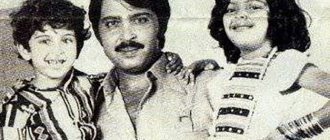Years of childhood and youth
A girl with an unusual name and surname - Ida Weiss - was born on the eve of the terrible Great Patriotic War in June 1941 in the city of Kazan. Her parents were doctors, and later the family moved to Irkutsk. By the way, Ida’s father, Solomon Weiss, was a fairly famous physician who eventually received the degree of Doctor of Medical Sciences.
The mother and father of the future singer dreamed that their daughter would continue their professional path and also begin to heal people.
However, little Ida, who did not yet know that years later she would be called Aida Vedishcheva, and her biography would be rich in complex and contradictory events, already in her early childhood amazed those around her with the depth of her acting and singing talent. The girl organized performances to which she invited her friends, acquaintances and friends of her parents.
However, the parents, generally not denying their daughter the realization of her dream of becoming an actress, demanded that Ida first enter a serious university and only after graduation choose her destiny on her own.
The girl had to come to terms with this demand. As a result, she brilliantly graduated from the Institute of Foreign Languages. Fluent knowledge of languages ended up being very useful for Ida.
Vedishcheva, Aida Semyonovna
She was born in Kazan just before the war in the family of Doctor of Medical Sciences, Professor Solomon Iosifovich Weiss (1886-1968), head of the departments of odontology of the Irkutsk Medical Institute, therapeutic dentistry of the Kazan Dental Institute and dentistry of the Kazan GIDUV, and Elena Mitrofanovna Emelyanova, dentist of the Irkutsk Regional Dental Clinic .
Since 1951, the family lived in Irkutsk. In Irkutsk she graduated from a music school, where she played in the student musical comedy theater, and then from the Institute of Foreign Languages, where she studied German and English. After graduating from the institute, she left for Moscow and tried to enter the Higher Theater School named after M. S. Shchepkin, but the attempt failed. Thanks to her beautiful, strong voice, she began her singing career.
| excerpt from the song “Forest Deer” | |
| composer: Evgeny Krylatov, lyrics: Yuri Entin | |
| Reproduction help | |
She began performing on stage in the early 1960s as a pop singer of the Kharkov Philharmonic. She sang in O. Lundstrem's orchestra, then in L. Utesov's orchestra.
Since 1966 she gave solo concerts with the Meloton ensemble, and also sang in the Blue Guitars VIA I. Granov. In 1966 she became a laureate of the First All-Union Soviet Song Competition. She gained all-Union fame by singing “Song about Bears” in the film “Prisoner of the Caucasus” in 1966 (the record sold seven million copies).
In 1968, she received a diploma at the festival in Sopot for the song “Geese, Geese”. This was followed by the following songs: “Volcano of Passions” (“Help Me”) from the film “The Diamond Arm” (1968), the song “Comrade”, popular in those years (“So that a comrade carries friendship along the waves...”, 1970), “Forest Deer” (from the film “Oh, this Nastya!”, 1972), “Blue Water” and others.
Despite the success with listeners, she, like some other singers (V. Mulerman, L. Mondrus, M. Kristalinskaya), was faced with obstacles[1][2]: they were not always mentioned in the credits of films, concerts were not allowed, they were not released on tours abroad. According to the opinion shared, in particular, by Fyodor Razzakov, one of the reasons for this was the anti-Semitism of the head of the State Television and Radio Broadcasting Company S. G. Lapin[3][4]. For example, the song “Forest Deer” was performed in the final of “Song-73” by the Big Children’s Choir of Central Television and All-Union Radio[5][6]. Since the mid-seventies, the singer’s name has disappeared from the credits of films and cartoons with her participation. However, the singer herself says that she fell out of favor with officials of Soviet culture after the festival in Sopot:
“I immediately made friends with European stars - Gelena Vondrachkova, Radmila Karaklaich, Karel Gott. And just imagine: on one of the competition days they announce on the local radio: “Soviet troops have entered Prague.” What started here! Karel Gott left the competition with the words “I can’t sing when the Motherland is in danger.” I felt so bad, so ashamed, as if this deployment of troops was my personal fault! And then there were phone calls from Moscow: “Don’t sing to Vedishcheva!” The authorities were afraid that out of solidarity with the Czechs the public would boo the representative of the Soviet Union. But I disobeyed. She spoke. And she sang several songs instead of one. Despite the political turmoil, they greeted me superbly, called me for an encore and, based on the results of the competition, awarded me second prize. And at this time in Moscow, the Minister of Culture Furtseva was already reported about my prank. That's how I ended up on the blacklist. They stopped showing me on television, broadcasting me on the radio, and concerts were cancelled.”
— From the interview “Somewhere in the White World...”
In 1980, she left with her mother and son for the USA. According to her, back in 1978, by order of the Ministry of Culture, all the few videotapes with the singer’s performances were demagnetized and all records of the radio fund were erased; however, they were preserved in the personal music library:
“By order of the Ministry of Culture, all my records were demagnetized. I found out about this by chance while on tour in Uzbekistan. But I’m a meticulous person, I rewrote all my songs after performances for myself, I collected my own music library […]. The most important thing that I managed to take away was my music library. They didn't want to let her through. Not allowed. Leave it! And then I sang “Help me!” to the whole airport. That’s how the song saved me; the customs officers, of course, recognized me and waved their hand.”
— [7].
In America, Vedischeva had to start her singing career from scratch, enter a theater college and undergo a four-year course of study, studying American cinema and dance. She first settled in New York, then moved to Los Angeles. She created her own theater and her own television show on Californian TV. The only pop singer from Russia who has achieved unconditional recognition in America[8][9]. Performs under the pseudonym Amazing Aida
. Performs mainly American repertoire - songs from popular Broadway musicals and Hollywood films; in addition, songs by Michel Legrand, Russian and gypsy romances, Jewish songs.
Subsequently, she began to perform less often, but began to write songs herself. Among her songs are “The Ballad of Chernobyl”, “Life is Music”, “Christmas”, “America”, “I’ll be back, Moscow!”.
Since 1989, she has visited the Soviet Union several times, then Russia. She took part in the “Golden Hit” festival in Mogilev.
In the early 1990s, she was diagnosed with stage three cancer [ source not specified 2906 days
]". Despite the doctors' warnings, she insisted on surgery and underwent a course of chemotherapy, and the disease subsided[10][11].
In 1998, Vedishcheva staged the show “Miss Liberty - for the New Millennium.”
After the 2001 terrorist attack, she wrote the musical “Masterpiece and Singing Liberty” and dedicated it to the Statue of Liberty. The musical ran in 2007 on Broadway[10].
In 2020, the play “The Thaw. Melodies of Fate”, dedicated to the work of three Soviet pop stars - Nina Brodskaya, Aida Vedishcheva and Larisa Mondrus.
In 2020, Aida Vedishcheva donated two concert dresses from the 1970s to the collection of the fashion historian Alexander Vasiliev Foundation, one of which was created according to a sketch by the artist Boris Messerer in the workshops of the Bolshoi Theater[12].
Family
- The first husband is Vyacheslav Vedischev, a circus performer and tightrope walker. son Vladimir, businessman and musician.
The first bold steps on stage
It was at the institute that Aida Vedischeva (her biography indicates that this happened in 1951) began to actively perform on stage, participating in student amateur performances. This was also facilitated by the fact that the girl had a musical education: she first graduated from a music school, and later from a music school.
After receiving a diploma of higher education, Ida left for Moscow. She sought to enter the famous Shchukin School. However, the young girl did not pass the competitive selection, which, however, did not break her.
Ida began performing in song groups, performing various parts, mostly solo numbers on the stage. Thanks to her unique voice, she was able to gain popularity among viewers.
Vocal talent unexpectedly brought the aspiring young singer her first success.
Aida Vedishcheva has managed to do a lot over the years, a biography whose personal life has always interested her fans.
First Ida changed her name. Her new name seemed more interesting to her for stage performances. In addition, she got married and took her husband's surname. The marriage was short-lived, but Aida managed to give birth to a son, Vladimir.
The singer often changed creative teams and even managed to work with the famous orchestra of Leonid Utesov. Already in 1966, she became a laureate of a popular pop song show in the USSR. Her career developed rapidly and successfully.
Links
- [karradio.ru/articles/113/ Interview with Nezavisimaya Gazeta]
- [pressa.irk.ru/kopeika/2006/05/009001.html Aida Vedishcheva - singer behind the scenes] (“Kopeika”, February 10, 2006)
- [www.mk.ru/blogs/MK/2002/03/25/archive/140188/ Somewhere in this world...] (“Moskovsky Komsomolets”) (inaccessible link from 06/18/2016 (1445 days) - history
) - [www.radiorus.ru/issue.html?iid=129528&rid=352 Aida Vedishcheva: no one wanted to leave] (Radio Russia)
- [sobesednik.ru/culture/chetyre-muzha-aidy-vedishchevoi Four husbands of Aida Vedishcheva] (“Interlocutor”)
- [vmiremusiki.ru/aida-vedishheva.html Aida Vedishcheva: “Don’t be afraid to start from scratch”]
Films of the famous director L. Gaidai
The performance of songs in the films of the famous film director brought singer Aida Vedishcheva real all-Union fame. However, this glory was very peculiar. The whole country recognized her voice, the song about bears rubbing against the earth’s axis, or the song about love with its ocean of passions was familiar to every Soviet viewer, but not everyone knew who owned the wonderful voice behind the scenes. Aida’s name was not even mentioned in the credits, which greatly offended and upset the young singer.
But she didn’t give up, especially since no one could stop her from performing these songs at concerts. Having heard the familiar performance, the audience immediately understood that in the films these songs were heard in the voice of Aida Vedishcheva, whose biography included the “star period” of bright songs.
Songs
- Sea Devil
- Cranes (music by E. Hanok, lyrics by A. Dostal)
- Love (music by O. Feltsman, lyrics by N. Olev)
- Respond (music by S. Pozhlakov, lyrics by N. Malyshev)
- I will wait for you, 1968 (music by A. Zatsepin, lyrics by O. Gadzhikasimov)
- Comrade (music by O. Ivanov, lyrics by A. Prokofiev)
- You will still be mine, 1969 (music by A. Zatsepin, lyrics by L. Derbenev)
- You argued in vain (music by B. Savelyev, lyrics by V. Kharitonov)
- Farewell to Bratsk (duet with Yu. Puzyryov, music by A. Pakhmutova - lyrics by S. Grebennikov and N. Dobronravov)
- Come what may (music by Y. Frenkel, lyrics by M. Tanich)
- Steps on the grass (music by M. Legrand, lyrics by I. Reznik)
- Song about Dushanbe (from the film “White Piano”)
- Arithmetic, 1969 (music by V. Khvoinitsky, lyrics by N. Olev)
- Where are you rushing, 1968 (music by B. Savelyev, lyrics by L. Derbenev)
- Even or Odd, 1969 (music by V. Gamaliya, lyrics by I. Shaferan)
- Don't be born beautiful, 1970 (music by R. Mayorov, lyrics by O. Gadzhikasimov)
- Find me, 1969 (music by V. Khvoynitsky, lyrics by G. Beilin)
- Road, 1968 (music by A. Zatsepin, lyrics by O. Gadzhiksimov)
- Song about spring, 1968 (music by A. Zatsepin, lyrics by J. Ziskind)
- Song in an undertone, 1969 (music by S. Zaslavsky, lyrics by M. Plyatskovsky)
- Forest deer, 1971 (music by E. Krylatov, lyrics by Yu. Entin) - song from the film “Oh, this Nastya!”
- Ice, 1969 (music by A. Zatsepin, lyrics by L. Derbenev)
- Geese, geese, 1967 (music by S. Pozhlakov, lyrics by N. Malyshev)
- A man came up with a song, 1966 (music by I. Granov, lyrics by L. Derbenev)
- It’s just my age, 1970 (music by B. Savelyev, lyrics by M. Plyatskovsky)
- Old Garden (music by V. Mlinarsky, lyrics by L. Derbenev)
- My happiness was carried away by the sea (music by A. Dneprov, lyrics by A. Vedishchev)
- Make a wish (music by I. Granov, lyrics by D. Ivanov)
- I love you, Moscow (A. Abramova, L. Ivanova)
- The Witch (music by R. Mayorov, lyrics by O. Gadzhikasimov)
- Hope faith Love
- Song about bears, 1969 (music by A. Zatsepin, lyrics by L. Derbenev)
- Be with me as before, 1968 (music by V. Shainsky, lyrics by A. Nagornyak)
To movies
- “White Piano”
Road song (music by A. Zatsepin, lyrics by O. Gadzhikasimov) - First spring (music by A. Zatsepin, poetry by O. Gadzhikasimov)
- Song about Dushanbe (music by A. Zatsepin, lyrics by O. Gadzhikasimov)
- I will wait for you (music by A. Zatsepin, lyrics by O. Gadzhikasimov)
— Forest deer (music by E. Krylatov, lyrics by Yu. Entin)
- Song about bears (music by A. Zatsepin, lyrics by L. Derbenev)
- Help me, 1968 (music by A. Zatsepin, lyrics by L. Derbenev)
)
- Spring is music, 1968 (music by R. Mayorov, lyrics by A. Holguin)
To cartoons
- “Umka”
- “Lullaby of the Bear”, 1969 (music by Evgeny Krylatov, lyrics by Yuri Yakovlev) - “[www.youtube.com/watch?v=7LHlM2lDr_k And my mother will forgive me]”
- “[eslivamnravitsa.narod.ru/Retro/Pesni_50-60/Vedischeva/tovarisch.htm Comrade]”, 1970. The cartoon contains poems [lad-lad.ru/stihi/55-moshkovskaja/234-moshkovskaja.html%20Moshkovskaya%20Emma%20Efraimovna Emma Efraimovna Moshkovskaya] (inaccessible link since 03/15/2014 (2271 days)). Cartoon from 1975, director Anatoly Petrov, script: Genrikh Sapgir, Emma Moshkovskaya, cameraman Mikhail Druyan. Artists V. Gilyarova, Olga Bogolyubova, Elena Bogolyubova. Plot: Having quarreled with Mom, the Boy imagines himself going on an imaginary journey, but soon returns, realizing how bad it is to live without Mom. - Katerok - “Chunga-Changa” in a duet with Anatoly Gorokhov.
Difficult years of professional breakdown
Despite success on stage, the early 70s. It turned out to be a difficult period for Aida. She remarried her colleague and toured the country a lot. However, her concerts were canceled and she was often banned from performing, indicating that her style of performance did not fit into the strict framework of Soviet reality.
Some of her friends still believe that such persecution of the singer was connected not only with her strong character (Aida was not afraid of her superiors from the Ministry of Culture, did not grovel before the party leadership), but also with the fact that Aida was Jewish on her father’s side. And at that time, one of the major Soviet cultural leaders was a fairly well-known anti-Semite.
As a result of many years of such an attitude, singer Aida Vedishcheva, whose biography contains many bright events, decided to radically change her life. She emigrated from the country.
Notes[ | ]
- Two interviews
- Planid of Aida. Visiting the magazine "KRUGOZOR" - the legend of the Russian stage Aida VEDISHCHEVA Archived on March 31, 2010.
- Razzakov F., Fedotova S.
“And I will think!” / “Evening Moscow” No. 149 from 08/12/2004 (Retrieved March 25, 2009) - Razzakov F.I.
The death of Soviet TV: Secrets of television: From Stalin to Gorbachev. 1930-1991. - M.: EKSMO, 2009. - Final broadcast “Song-73”
- Razzakov F.
Behind the scenes of show business. - M.: AST, 2004. - P. 193. - 942 p. - American aria by Aida Vedischeva. - “Moskovsky Komsomolets”, No. 24927 dated December 1, 2008 (unspecified)
. www.mk.ru. Retrieved June 17, 2020. - Program "Idols" (undefined)
.
Archived from the original on February 11, 2010. (inaccessible link from 03/15/2014 [2270 days] - history
,
copy
) - Aida Vedishcheva. Somewhere in this world... (documentary film, scriptwriter: Yakov Dashevsky, director: Elena Solovyova, released: Russia, “GoldMedium”, year of release: 2006 (unspecified)
. - ↑ 123
"Sounds of Aida". Konstantin Ioch. "Rossiyskaya Gazeta" No. 244 (4801) dated November 23, 2008 - Defeated cancer (undefined)
. "Rossiyskaya Gazeta" (May 30, 2013). Retrieved June 10, 2017. - Tamara Gverdtsiteli and Alena Sviridova congratulated Alexander Vasiliev on his anniversary (unspecified)
. news.myseldon.com. Retrieved July 11, 2020.
America in the fate of a Russian singer
Those who lived in the Soviet Union know that such a decision to emigrate was difficult for people. Emigration actually cut off all ties with family and friends and put an end to the possibility of returning home. However, in 1980, Aida left the country, taking with her her music library, mother, son and 5 beloved dogs.
She had a hard time in the United States. Aida Vedishcheva (biography, photos from those years, as we see, show a completely changed woman) entered a music college, then created her own group and began to tour the country. At first, her name (she called herself “the amazing Ada”) attracted only a small group of Russian emigrants, but later the talented singer managed to win the hearts of American listeners.
Passion for singing and fortitude did the incredible. Soon the Aida Vedishcheva brand became popular in America. Biography, personal life, children, photos - fans were interested in everything. Fashion magazines wrote in detail about the singer's life, her photos appeared in popular publications.
Marry a real millionaire
As a result of her increased popularity, a real elderly millionaire drew the attention of Aida. His name was Jay Markoff. The singer soon agreed to marry this man. However, the marriage was not easy, despite the fact that financial difficulties receded into the background.
The husband was ready to pay all his wife’s bills, but he was against continuing the singer’s career. And Aida could not live without the stage.
As a result, she faced a difficult dilemma: on the one hand, she could lead the life of a rich lady, but on the other hand, she could not realize her talent. Five years later, the singer came to the conclusion that only a divorce would return her peace of mind.
Deadly disease and miracle cure
During the divorce process, the singer learned from doctors that she was very ill. The stage at which her disease was at was fatal. The doctors refused to perform the operation. However, Aida insisted on her own. She not only survived a major operation and several courses of chemotherapy, but also managed to meet her new love and get married during the same period. No longer for a millionaire, but for a man who sincerely loved both her and her work.
The singer herself said that when her last husband invited her to the dance floor, and she had just gone through a new course of chemotherapy and lost all her hair, she became scared. But even in the wig, swaying from weakness, she went to dance and realized that she would be able to overcome this life test.
Singer and actress Aida Vedishcheva: biography, personal life, children today
Despite her impressive age, the singer continues to actively tour in America. She often comes to Russia.
Both our and foreign journalists approach her with requests for interviews. Aida willingly talks about her life and work. She shares her childhood memories, describes solo concerts and her life in America.
Aida Solomonovna has every reason to be proud of the life she has lived. She managed to overcome a lot: meetings and partings, professional rise and collapse of her career, emigration, several marriages and finding love in old age, a fatal illness and miraculous healing, audience success and oblivion in her homeland...
But the singer herself speaks of herself as a happy person. After all, she managed to live a bright and original life and still realize herself in creativity. And few people can do this. Only a select few can say this about themselves.










